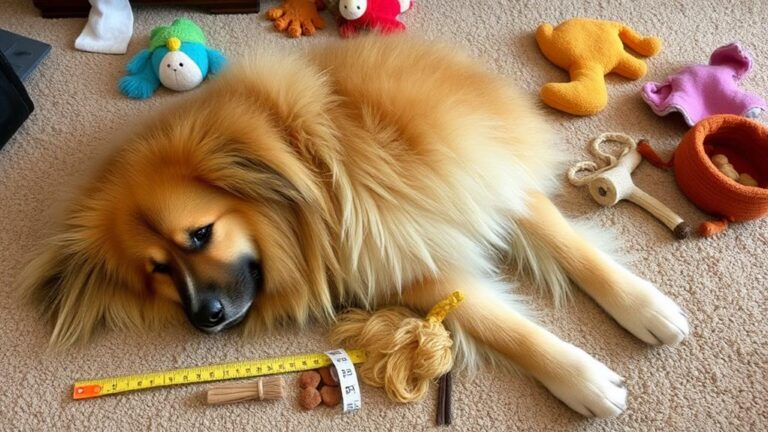The term commonly used to refer to a female dog is "bitch." This word has a long history, dating back to Old English. While it is the formal term, many individuals opt for "female dog" to avoid confusion. In specific contexts, such as breeding, the term "dam" is employed for a mother dog. Exploring these terms not only clarifies communication but also sheds light on cultural perceptions of female dogs. What implications do these terms have for dog owners and their relationships with their pets?
Understanding the Term "Bitch"
To understand the term "bitch," we need to look at where it comes from. This word has been around since about 1150. It comes from the Old English word "bicce." Originally, it simply meant a female dog.
In dog breeding, we also use special terms for dogs. A female dog is often called a "dam." This word helps us know she is the mother of puppies. The male dog is called a "sire." This means he is the father of the puppies.
Over time, the word "bitch" has changed in how people use it. For many, it still mainly means a female dog. It is important for people who own dogs or breed them to understand these terms. Knowing what "bitch," "dam," and "sire" mean helps in learning about dog care.
When caring for a female dog, many factors are important. Her health, comfort, and training matter a lot. Understanding her role in breeding can help new dog owners.
It's also good to know how to take care of both female and male dogs. Learning these definitions is helpful for anyone with a dog. Being informed makes you a better dog owner.
Alternative Terms for Female Dogs
When talking about female dogs, it's good to know the different words we can use. Most people know the term "bitch," but that's not the only option we have. For example, the word "dam" is used when we talk about a mother dog who has puppies. This word shows her special role in bringing new puppies into the world.
Sometimes, we might just say "female dog" if we want to be very clear about the dog's gender. In everyday conversations, people might use cute words like "puppy" or "pooch." These are friendly names, but they don't really tell us if the dog is male or female.
Using the right words can help when we're talking about different subjects. For instance, when discussing dog breeding or visiting the vet, it's helpful to be specific. Understanding these terms can also connect us more deeply with our pets. Each word we use has its own meaning and importance.
Related Canine Terminology
When we talk about female dogs, it's important to know some special words that help us understand them better. The word "bitch" is the proper name for a female dog. This term has been used for a long time, dating back to Old English! The mother of puppies is called the "dam," while the father is known as the "sire." These words are very useful, especially when talking about breeding dogs or visiting the vet.
We can also use the word "canine" when we refer to dogs in a more formal way. But there are many fun and friendly words we use too. For example, "pooch" is a cute way to say dog. It shows that we love these animals. Another word you might hear is "hound," which is often used for specific types of dogs like beagles or bloodhounds.
Learning these terms is super helpful. They allow us to talk clearly about dogs, their different breeds, and their roles when it comes to breeding.
Using the right words is very important, especially when discussing how to take care of dogs and understanding their behaviors. Knowing canine terminology can also make talking about our furry friends even more fun!
Cultural Views on Female Dogs
Cultural views on female dogs often show how people think about women and animals. The word "bitch" is a term used for female dogs. Some people use it in a friendly way. Others use it as an insult. This shows that we have mixed feelings about female dogs, just as we do about women.
In some cultures, female dogs are seen as symbols of loyalty and friendship. They are trusted companions who are always there for us. On the other hand, in some places, female dogs might be looked down upon. People may think of them as less important. This difference in how female dogs are viewed shows a complicated relationship between us and these animals.
Understanding how different cultures view female dogs is important. It helps us realize that our attitudes toward these animals can reflect how we treat women in society.
When we learn to respect female dogs, we can also learn to treat women with the same respect. By changing our views, we can create a kinder world for both female dogs and women.
It's important to talk about these attitudes so more people can appreciate the loyalty and love female dogs bring into our lives.
Synonyms for Dogs in General
There are many synonyms for the word "dog." Each word can mean something a little different. The word "canine" is a fancy term. It includes all types of dogs and their relatives. You might hear "hound" when people talk about dogs that help with hunting. Certain breeds, like Beagles and Bloodhounds, fit this description.
In everyday chats, you will often hear the word "pooch." This is a fun and affectionate way to refer to dogs. If someone has a puppy or a young dog, they might call it a "tyke" or "tike." These words sound cute and are used in a friendly manner.
Another playful term is "doggy" or "doggie." It is often used by children or when talking to the dog itself. Many people like to use these words because they sound loving and cheerful.
Using different words to describe dogs can make your conversations more interesting. Each of these synonyms can change the mood of what you are saying. For example, "canine" sounds serious, while "pooch" is light and fun. Knowing these different words helps us express our feelings about dogs better.
Language and Dog Slang
Dogs have a special language filled with fun words and phrases. These terms help us show love and playfulness when talking about our furry friends. For example, we often use the word "pooch" to refer to a dog. Another cute word we use is "doggie." Both express how much we care about them.
In some cases, the word "hound" can describe certain types of dogs, while "canine" is a more serious word used for all dogs. But not all slang is positive. Sometimes, calling someone a "dog" can be mean. It can suggest that the person is worthless or not good enough.
In African-American slang, "dawg" is friendly. Friends use it to show they care about one another. Even though calling someone a "dog" can upset people, using "dawg" can make people feel close, like they are part of a group.
Over time, words can change their meanings. The way we talk about dogs shows how we feel about them. It's important to understand these terms to communicate better.
With all these colorful words, our conversations about dogs can be fun and lively. Each term reflects our love for these amazing animals and shows how they are part of our lives.
Conclusion
To summarize, the term "bitch" serves as the formal designation for a female dog, with roots in Old English. Alternative phrases, such as "female dog," offer clarity for broader audiences. In breeding contexts, "dam" specifically describes a mother dog with puppies. Understanding these terms enhances communication regarding canine care and breeding. Acknowledging the cultural views and language surrounding female dogs can foster better relationships between owners and their pets, promoting a deeper understanding of canine companionship.



